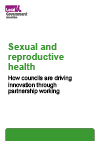
Introduction
Sexual health services are the third highest area of public health spending after drug and alcohol treatment and zero to five services.
More than £500m a year is spent on testing, treatment, contraception and health promotion and advice.
Like other areas of public health sexual health services have had to cope with cuts to their budgets. Between 2015-16 and 2020-21 spending fell by nearly 17 per cent as councils saw the public health grant from government cut.
But as a demand-led service it has not been possible for services just to do less. The numbers coming forward for consultations have increased by a third since 2013 – with the sharpest rises seen in the most recent years, partly driven by a jump in STIs. So services have had to adapt and change.
In some areas joint working between different councils has seen them benefit from economies of scale. Services have also become more agile and flexible with the use of mobile clinics helping staff reach into communities and engage more people, while also saving money on buildings.
It has also become clear inequalities exist that need addressing. Access to contraception can be a particular problem with the fragmented nature of commissioning – both local government and the NHS have their own responsibilities – posing challenges. Some councils have responded by creating integrated networks across sexual health clinics, GPs and pharmacies.
Other sexual health teams have worked with different parts of the local government family from social care to the voluntary sector to upskill staff or to work in partnership with them to engage hard-to-reach groups, such as sex workers.
Digital innovation has also been at the forefront of the new ways of working. Something that has been hastened by the unique demands of dealing with Covid.
Innovations such as these are helping services stay on top of demand, while funding is squeezed, ensuring as many people as possible get the support they need to enjoy good sexual health.
